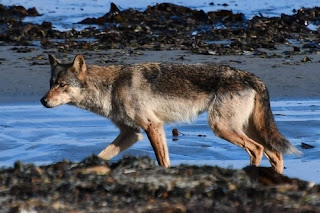January Calendars - 2022

My 6 calendars each have a different poster animal for January. Here's a summary. (Note that these calendars probably over-represent charismatic megafauna .) Defenders of Wildlife has gone with the Alexander Archipelago Wolf , a subspecies of Timber Wolf. I probably have a picture of a Vancouver Island Wolf, but there is reason to believe they should both be considered the same species. Coastal Wolf September 2021 Photo 161788080, (c) Marcie Callewaert John, some rights reserved (CC BY-NC) One of my Audubon calendars has gone with someone you can see here in NJ, the Black-capped Chickadee . This is our most widespread chickadee, though the (very similar) Carolina Chickadee is making inroads. Black-capped Chickadee January 3, 2018 at Corvallis, Oregon Photo 174938497, (c) macrhybopsis, some rights reserved (CC BY-NC) My other Audubon calendar has gone with the Florida Scrub-Jay , a species that is a candidate to be the Florida state bird. Florida Scrub-Jay December 2021 at Polk Cou
